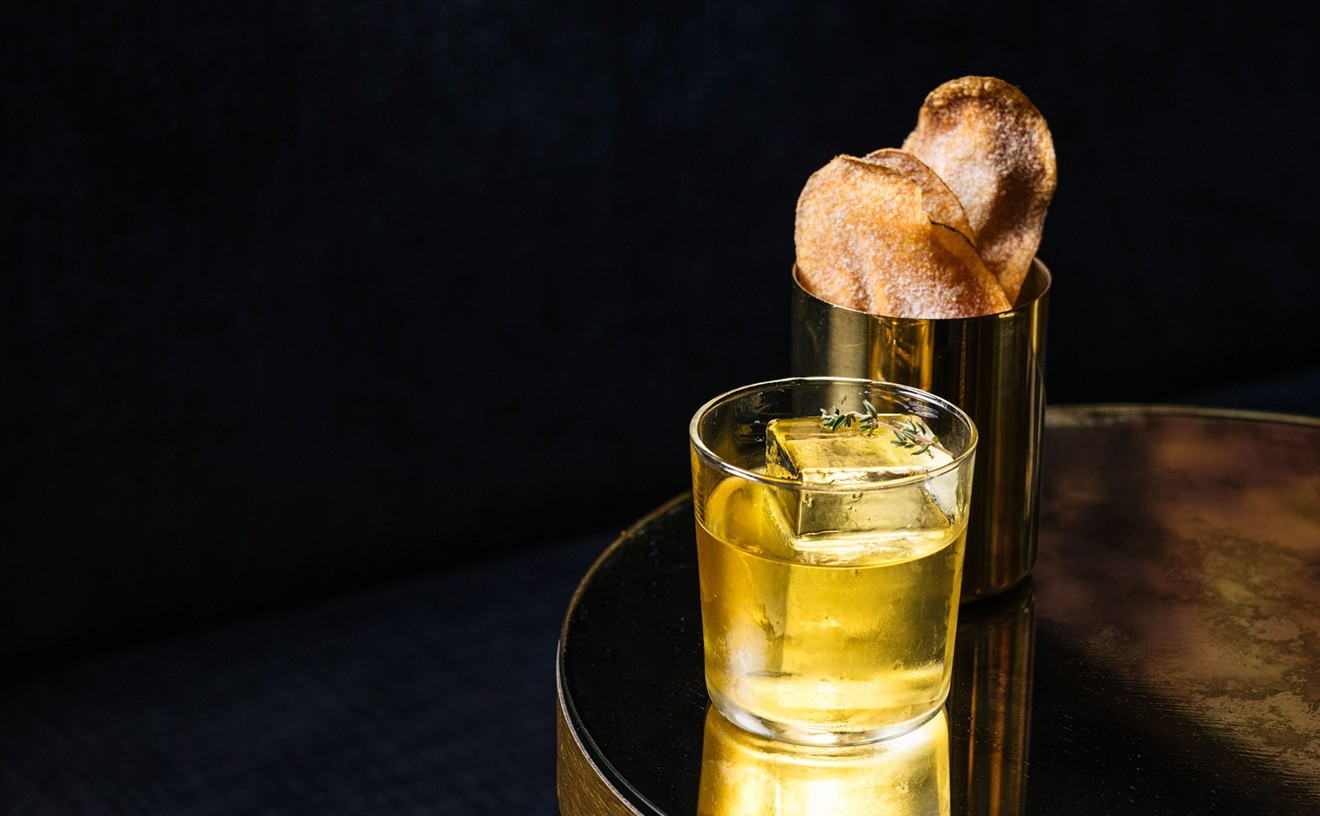Chou's Kitchen isn't just the kind of restaurant that's used to being excluded. It's the kind of restaurant that's used to being excluded twice.
In the Valley, this restaurant's menu of mostly unfamiliar northeastern Chinese cuisine (devoid of Americanized General Tso's chicken, crab wontons, and fortune cookies) might turn less-adventurous diners in the direction of the nearest P.F. Chang's. And in China, where Cantonese, Hunanese, and Sichuanese cuisine are included in the "eight great traditions" of Chinese cuisine, Dongbei cai doesn't even make the cut.
But that doesn't mean there isn't goodness to be had. At Chou's Kitchen, a humble eatery in a strip mall in Chandler, unique dishes — possibly, the only ones of their kind in the Valley — await.
Once known as Manchuria, Dongbei, which consists of the three provinces of Liaoning, Jilin, and Heilongjiang, extends from Beijing north toward Siberia. Previously home to nomadic tribes, then to various empires and dynasties, Dongbei's cuisine is a virtual melting pot of cooking styles, from native Manchu to northern Chinese to Russian, Korean, and Japanese. And the region's long winter means stocking up on preserved foods, especially through pickling, and cooking food hardy enough to see its residents through the season.
Rice, a food many equate with China, is grown only in small amounts in the northeast. Wheat is the staple crop here, which means a starch-heavy diet — and dough. Lots and lots of dough.
At least that's how Chou's Kitchen owners Tong Rizzo and Ping Chou see it. They say the people of their native Liaoning region are "dough people" and favor dishes like dumplings, fried buns, and meat pies to keep the cold at bay.
Water temperature dictates the dough's suitability to dishes. Hot water means the dough will be flatter and stronger, perfect for Chou's Kitchen's plump, homemade dumplings filled with anything from vegetables and egg to pork, chives, and shrimp. Warm water is used to form the flaky crust of slightly sweet pancakes flecked with scallions. Cold water makes the dough rise more, so it's used in meat pies, which Rizzo calls "Chinese hamburgers." And, my, are they good.
Pan-fried to a luscious golden brown and filled with ginger-kissed beef or pork steeped in a light broth, it's easy to like these hand-held treats, which could work as a snack or an on-the-go breakfast. And they can be dipped into a mix of soy sauce and chili paste for added flavor. During the 2008 summer Olympics, the meat pies in Dongbei were so popular that they were prepared by the thousands and shipped from the region to Beijing as a culinary emissary.
Chou and Rizzo missed the opportunity to make meat pies for the 2008 Summer Games. By then, the two already were in the States. Although they both arrived in 2007, they wouldn't get to know each other until early 2011, when they met at church and began talking about a shared passion for cooking. Ping suggested they open a restaurant near the church. And so they did on March 8, 2011 — International Women's Day, an official holiday in China.
"I knew I wanted to be a chef since I was a little girl helping my mom in the kitchen," Chou told me through a translator. "But in China, you can't choose your career. I worked in hotels for a while and then went to culinary school, worked in restaurants, and had one of my own, but my dream was always to come to America because it is a free country. Now, my dream has come true."
Chou and her partner focus on Liaoning's strong, distinctive flavors, colorful presentations, and soft textures. Each is found at Chou's Kitchen, even if the descriptions on the selection-packed menu do little to sell the dishes.
The rather bland-sounding "cold noodles (spicy)" is actually served at room temperature, the nest of fat noodles alive with sprigs of cilantro, scallions, long slices of cucumbers, peanuts, and a steady heat, thanks to a chili paste. And the cryptic "green bean jelly with vegetables" actually is a northeastern version of a dish popular on the streets of Beijing, featuring a foundation of bouncy cellophane noodles topped with an anything-goes multitude of ingredients. In the case of Chou's Kitchen, a tangle of flat translucent noodles is surrounded on a large platter by colorful piles of carrots, cucumber, bean sprouts, ham, egg, and mushrooms. Everything is then tossed with a sharp dressing made of soy sauce, sesame paste, and peanut butter for a deeply satisfying combination of flavor and textures akin to the Chinese version of a Cobb salad.
If you're inclined to pass on the lip-smackingly good cold plate of thin, spicy pieces of tender beef tripe and chewy tendon (the region is well practiced in nose-to-tail dining) tossed with celery, peanuts, and scallions, there exists an animal option of another kind: lao hu cai, or "tiger salad." The listing — "salad with green onion, parsley, and jalapeño" — sorely misrepresents this dish's lively flavor. Cool and colorful, loaded with crunchy veggies, cilantro, and flat tofu noodles, and lightly tossed with a dressing of soy, sugar, and vinegar, its slightly salty taste pairs perfectly with a plate of less-intense fried buns filled with beef or pork.
One traditional dish features slender wild mushrooms (picked in Chou's home city and brought to her by her son) that appear with chunks of golden fried potatoes and tender pieces of chicken. With its aromatic broth, it's a rustic feast that will have you swooning. Another Dongbei classic, di san xian (loosely translating to "three delights from the Earth") is a stir-fry as straightforward as it is satisfying. Chunks of bright purple eggplant wedges, potatoes, and firm, fresh peppers tossed with vinegar and garlic make for what could be a habit-forming dish.
In Dongbei, the repetitiveness of starch is remedied with vinegar, a trademark of the cuisine. Found on every table at Chou's Kitchen, it can be used as a dipping sauce for juicy boiled dumplings and pot stickers and to liven up bland samp (cornmeal congee soup). Or, along with her homemade suan cai (salted, fermented cabbage that tastes like sauerkraut), it can pep up a warm broth of lamb and cellophane noodles. For the uninitiated, its intense flavor can be off-putting or, like Chou's cold smoked fish, an acquired taste.
The restaurant boasts a small, pleasant interior bathed in light green, adorned with photos of the food, and packed with several tables, mostly with chairs for four or more — appropriate, given the restaurant's primarily Mandarin-speaking customer base of families with little ones barely able to brandish their beef pies, 20-somethings in sneakers and hoodies sharing spicy plates of tasty cabbage salad and stir-fried noodles with jalapeños, and groups of salt-and-pepper-haired seniors catching up on the news of the day over a hearty bowl of za jiang mein (Chou's homemade thick wheat noodles topped with slices of salty ham and crunchy cucumber).
The unfamiliar fare, bare-bones menu, and a language barrier may seem the ingredients of a daunting experience. But first-time diners should note that helpful service, usually from Rizzo, means experiencing an array of unique dishes from a region in China unknown to most. And at Chou's Kitchen's wallet-friendly prices, this culinary journey is an affordable one.
During your meal, you most likely will see Chou crafting her doughy creations behind a glass window for the day's dishes or for the freezer in the dining area, where many of her customers buy them by the bag to enjoy at home. For the pot stickers alone, Chou makes about 1,000 every day, she says.
Which may make Ping Chou queen of the "dough people." At least in Arizona.










